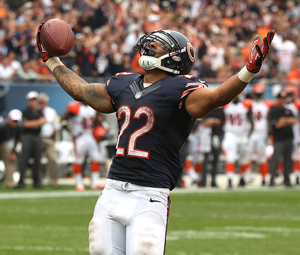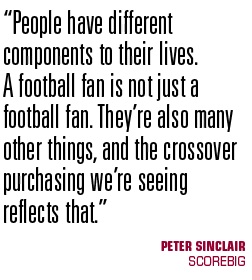When Ticketmaster markets tickets to a dance or electronica concert, it can approach plenty of logical targets. Past purchasers of concert tickets in those genres represent an obvious tool. Those who have searched ticket listings in those areas is another. So are fans who have expressed fandom in artists such as The Chemical Brothers or Rihanna.
But how about tennis and mixed martial arts fans?
 |
Ticket companies are using data to profile consumers and then target offers for future events, from concerts to sports.
Photo by: Getty Images (2) |
As big data and advanced consumer profiling sweep through the ticketing industry and American commerce at large, ever-improving algorithms are helping companies link music fans and sports fans, and generate significant incremental purchases.
The core reasons beyond the attempt to link the once-disparate realms of sports and music ticketing are not hard to understand. Company research from major ticketing players such as Ticketmaster, Tickets.com and StubHub suggest that a buyer of one type of ticket is at least twice as likely as the general population to buy the other type, and that consumption of live events in general begets more consumption.
Until recently, however, many attempts to move between sports and music ticketing have been more clumsy and imprecise.
“We’re now beginning to do a much better job of finding the links and targeting our customers with better promotional emails and a better overall website experience,” said John Forese, Ticketmaster senior vice president and head of the company’s research arm LiveAnalytics.
“We’re actually now seeing a situation where some of our sports clients are coming to us for advice on which acts to bring in on off-nights in their buildings that will appeal to their season-ticket holders, and vice versa with the concert promoters,” Forese said.
Scott O’Neil, new chief executive of the New Jersey Devils and Philadelphia 76ers, said cross-genre ticketing data will be particularly helpful as he begins to oversee business operations of the Prudential Center. The Devils do not constantly sell out their home games, like some of their NHL rivals. And O’Neil is trying to use data, in part from Devils purchasers, to turn one-night concert dates into multiple-night stands.
“The power of the data is real,” O’Neil said. “The days of the big email blasts are obviously gone. So the question is how do we use data to make the absolutely right, most targeted offer and keep the building busy. It’s still early days, really, but the possibilities are very exciting.”
Many of the major ticketing companies have developed their own proprietary algorithms to determine which music
acts and genres match up best with which teams, leagues and sports. Many of those algorithms are based upon internally generated data, such as purchase and search histories, and preferences and fan interest polls submitted by users. Some companies supplement that internal information with third-party content, such as general consumer data obtained from research firms like Acxiom.
The data-driven matchmaking often generates results that would seem intuitive based on general demographics, such as country music fans having a disproportionate interest in NASCAR.
But it’s also the more unpredictable links between things like tennis and electronica that help justify the efforts.
Discount ticketing channel ScoreBig, for example, has found vast amounts of purchasers of Sesame Street and Disney shows among its sports ticket buyers.
“People have different components to their lives,” said Peter Sinclair, ScoreBig vice president of marketing. “A football fan is not just a football fan. They’re also many other things, and the crossover purchasing we’re seeing reflects that.”
Rather than using data to just make pairings between various sports and music acts and genres, though, the ultimate goal is to develop a personalized ticket-buying experience across all forms of live entertainment.
That personalization manifests itself in several ways, from highly targeted emails to website customizations, and push notifications through mobile applications. And when buyers receive more targeted marketing from a ticket company, they generally have been at least twice as likely to click through or respond.
“We’re really pushing on a path to personalization,” said Michael Lattig, StubHub head of brand and creative.
“Grouping definitely helps identify various proclivities, and certainly helps with lookalike modeling. But really the goal is a fully tailored, individual experience. It’s a combination of behavior, demographics and preferences. But ultimately, what we want is to make sure nobody misses an event they want to attend.”
To that end, event discovery remains at the heart of the crossover research. About 40 percent of all live tickets go unsold each year, and the cross-genre data mining in many ways is about trying to lower that figure.
“Unsold tickets remains a really big problem, and our core being is all about trying to solve those kinds of problems,” Sinclair said. “So research like this lies at the heart of everything we do.”
Business rules, however, still govern a lot of what is happening in the cross-genre data mining. Many specific teams and venues have as part of their contracts with their ticketing vendors that their consumer data belongs solely to them. As a result, the data in many instances is used simply to fill a team’s own venue, and not to help sell shows at another venue in town. Those business rules vary greatly from ticketing company to company, depending on whether they operate in the primary or secondary markets, or both.
“We’ve been pretty firm that our clients’ data belongs to them, and most of them wouldn’t take too kindly to me trying to use that to market something down the street,” said John Walker, Tickets.com president and chief executive. “The information has been very helpful for things like when our baseball team clients stage concerts.
And we’ve built a reporting tool for our clients to go in and analyze data. But that data belongs to them.”






